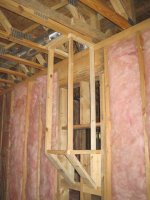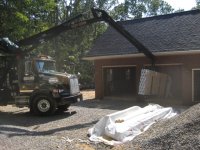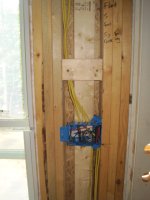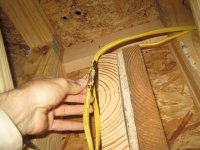dstig1
Super Member
- Joined
- Apr 7, 2010
- Messages
- 5,563
- Location
- W Wisc
- Tractor
- Kubota L5240 HSTC, JD X738 Mower, (Kubota L3130 HST - sold)
.
Some words of wisdom fr Fine Home Building magazine:
Owner-builders doing their own work are often tempted to move in to their house before the finish work is done, thinking it will be easier to do when it's close at hand. After a while, they don't notice the lack of trim, especially if there's furniture in the way, and it becomes harder and messier to set up the tools and work around the obstacles. It can be a strain on a marriage if the bathroom doors aren't hung after a few years of residence. I advise owner-builders to get everything done before they move in, and contractors to finish all work before they move on. They'll be glad they did.
.
Caution - Diatribe Ahead!!!
I read that when it came out and got a good chuckle out of it. And it wasn't the opinion of FHB, it was the opinion of one author... There is some merit in what he says, but only as a point to stimulate some thinking. Realistically it isn't possible to do what he says as the timescale for one person working on a whole house is much longer than any typical crew. A contractor has separate whole crews of subs for each task. You as the Owner/Builder have...well, YOU. And maybe a friend/relative/helper from time to time.
But IMHO, the thing to take away from that article is that unfinished space can drag on. OK, use that point to your best advantage as you probably can't finish everything before move-in. So say the MBR is a big deal - will take a lot of time. Finish trimming a simpler guest room, then move into that and keep the MBR clear. Now you can focus and work on it without a full BR full of furniture in the way. The same goes for other rooms - you need a bathroom, just maybe not the MBath for move in. So finish off a key one ahead of time. Kitchens are tough to get around - pretty important to get that done as early as possible. A key thing to remember about construction order is that the farther along you get in the process, the slower it goes. Digging the foundation can often be a day or two process (depending on the lot, etc) whereas trimming out the house can easily take weeks, even for a pro crew in a detailed house.
The only other thing an Owner/Builder can do to help this out is to "time shift". During a typical contracted house, the builder will call in the subs as needed. Think about the cabinet guy - called in late in the process. But he and his crew can crank out a set of cabinets in a few weeks, whereas you as the O/B do not have that time at that stage of finish to drop everything and build cabinets for weeks. But if you plan well, you can build them even before you break ground (guess what I'm doing right now?
If you are an O/B, there is no magic bullet. It all takes time, and lots of it. Think and work smart to take best advantage of what you can do, but be prepared for very extended timelines. When you look at the total man-hours in a house and then divided by a crew of one, well.....you get the picture.
And of course this is all totally OT as Obed is not an O/B but is only (and he says "only" like it is sooo trivial :laughing: ) acting as the GC on his house. That is a different set/subset of issues such as shorter timelines, but now having to get subs to do what you want - correctly...
My 2 centums
-Dave








